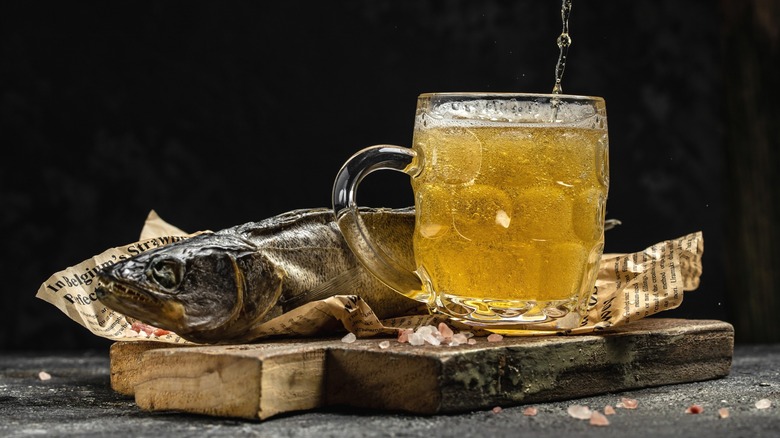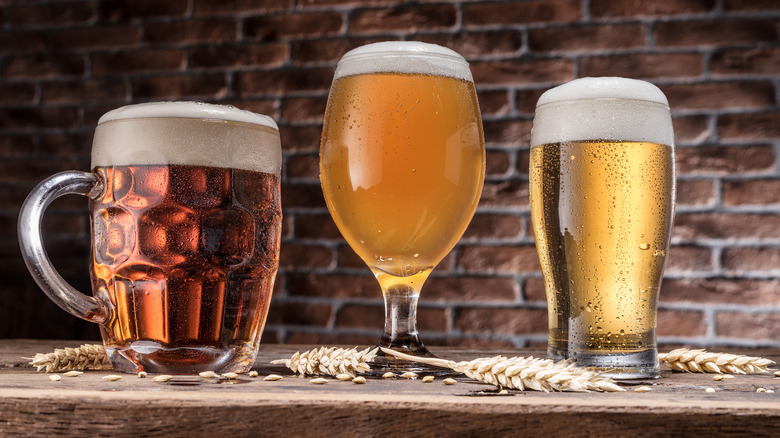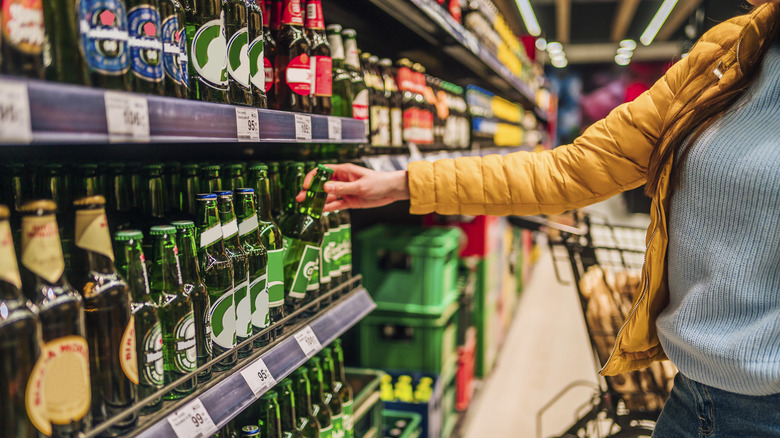Are There Fish Bladders In Your Beer?
When you consider what beer is made of, you most likely think of its four main ingredients: hops, malt, water, and yeast. Aside from fruity or spiced varieties, you might not expect too many other things to be in there — especially not fish. But that's what isinglass is made from — a collagen similar to gelatin extracted from fish swim bladders (most commonly sturgeon or perch), which is used to clarify beer. Before clarifying, aka fining, the yeast used in fermentation leaves beer looking cloudy. While the yeast will naturally settle on its own given time, to speed up the process, early brewers began using isinglass to filter it out faster.
While modern methods of filtration are now widely in use, including centrifuges as well as diatomaceous earth made from fossilized algae silica, which works much like a strainer, some breweries still rely on isinglass. While the substance is mostly removed from the finished product, having any amount of animal product either in or used in the process of making a beverage is enough to make some people bristle. Vegans, vegetarians, people with allergies, and even those who follow certain religions have legitimate reasons for avoiding beer made with isinglass. Take, for example, those who follow Jewish dietary law ... sturgeon is not kosher. But without seeking out the information yourself, you'd likely never know if fish bladders were used in your beer or not since manufacturers are not required to list isinglass as an ingredient on the label.
How to know if beer is made with isinglass
The good news for those who wish to avoid beer that's been anywhere near fish is that many beers these days are made without isinglass. As more effective animal-free technologies have been developed, isinglass is falling out of favor. Along with the aforementioned centrifugal and sand filtration, other innovative clarification alternatives include bentonite clay, Irish moss seaweed, pea extract, and pectin enzymes made from fruit. Some brewers are deliberately keeping their beers cloudy, as evidenced by the proliferation of IPAs with "hazy" in their names. And of course, there's also classic German hefeweizen-style beer that proudly displays its hazy nature.
Most of the bigger beer and brewery brands made or sold in the United States today are vegan, and therefore free of all things fishy. Well-known options made without isinglass include Becks, Budweiser and Bud Light, Coors, Corona, Colt 45, Dos Equis, Guinness, Heineken, Miller, Pabst Blue Ribbon, Sierra Nevada, and Stella Artois.
Unless made by specifically vegan brands, most bottles and cans will not be labeled as such. One of the best ways to find out if a beer is made with fish bladders is to check a website called Barnivore. The site is a vegan alcohol directory with over 58,000 user-submitted and verified entries where you can look up products by name and easily find out whether they are made with animal-based ingredients or not. It also includes listings for cider, wine, and liquor.
Other animal ingredients used in beer making
Most beers that are still made with isinglass are more often than not unfiltered cask ales, which brightens the beverage. You might be surprised to learn that a number of other animal ingredients are commonly used in beer making as well.
Lactose or whey derived from milk is used to sweeten milk stouts. Casein is also a milk product and is used as a beer filter; it's the same non-vegan ingredient that's in non-dairy creamer. Another regularly used clarification agent is gelatin, made from animal skin, bones, cartilage, and connective tissues. Similarly, chitin and chitosan (made from the shells of crustaceans like crabs and lobsters) are also used in the fining process.
Some beers get their foam from albumin, which comes from egg whites. Honey is sometimes used to flavor beer and — since it is made by bees — is also considered not vegan. Another ingredient utilized in beer brewing filtration is also used to remove impurities and color in white sugar — bone char is exactly what it sounds like — charred animal bones that turn into a type of charcoal also known as bone black.
This incomplete list includes only some of the animal ingredients used regularly in beer making. If you wish to avoid them, be sure to either check the online directory for your preferred brew's ingredients or contact the brewery directly for the most up-to-date information on how their product is made.



